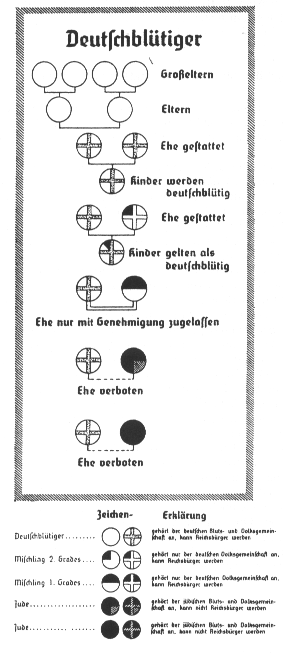Nuremberg Laws facts for kids
The Nuremberg Laws were a set of unfair rules put in place in Germany in 1935. These laws were active until 1945. They got their name from the city of Nuremberg, where the German government met to create them. These laws were a big part of how the Nazi Party treated Jewish people.
Contents
What Were the Nuremberg Laws?
The Nuremberg Laws were two main laws passed in 1935. They were designed to take away rights from Jewish people. These laws were a key step in the Holocaust. They made life very hard for Jewish people in Germany.
The Reich Citizenship Law
This law said that only people of "German or related blood" could be citizens of Germany. This meant that Jewish people were no longer German citizens. They lost their rights to vote and hold public jobs. They became subjects of the state, not full citizens.
The Law for the Protection of German Blood and German Honor
This law was about who could marry whom. It banned marriages and relationships between Jewish people and non-Jewish Germans. It also stopped Jewish people from hiring German women under the age of 45 to work in their homes. The Nazis believed this law would keep the German "race" pure.
Defining "Jewish"
The Nuremberg Laws had very strict rules about who was considered Jewish. If a person had three or four Jewish grandparents, they were seen as Jewish. If they had two Jewish grandparents, they were called a "Mischling" (mixed-blood). Even if someone had converted to Christianity, they were still considered Jewish if their grandparents were Jewish.
Why Were These Laws Created?
The Nazi Party, led by Adolf Hitler, believed in a false idea of "racial purity." They thought that Germans were a "master race." They blamed Jewish people for many problems in Germany. These laws were a way to separate Jewish people from the rest of society. They wanted to control and oppress Jewish people.
Impact on Jewish People
The Nuremberg Laws had a terrible impact. Jewish people lost their jobs, their homes, and their businesses. They were not allowed to go to many public places. They could not attend German schools or universities. These laws made Jewish people feel isolated and unsafe. They were treated as outsiders in their own country.
Loss of Rights and Freedom
Jewish people could no longer work for the government. They could not be doctors, lawyers, or teachers for non-Jewish Germans. Their passports were marked with a "J." This made it very difficult for them to leave Germany. The laws took away their basic human rights.
How the Laws Ended
The Nuremberg Laws were in effect until 1945. This was when World War II ended and the Nazi regime was defeated. After the war, these laws were officially cancelled. The world learned about the terrible things that happened under these laws. This led to new international laws to protect human rights.
Images for kids
-
Members of the SA picket in front of a Jewish place of business during the Nazi boycott of Jewish businesses, 1 April 1933.
-
Decree of Tsar Boris III of Bulgaria for approval of The law for protection of the nation
See also
 In Spanish: Leyes de Núremberg para niños
In Spanish: Leyes de Núremberg para niños
 | Kyle Baker |
 | Joseph Yoakum |
 | Laura Wheeler Waring |
 | Henry Ossawa Tanner |










